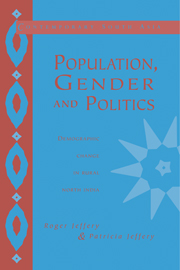Book contents
Preface and acknowledgements
Published online by Cambridge University Press: 07 January 2010
Summary
Since the early 1980s we have carried out three extended periods of fieldwork in Bijnor District, in the northern Indian state of Uttar Pradesh. Our Muslim research assistant, Swaleha Begum, had worked for us in 1982 and in 1985, and we were keen to have her work with us again when we arrived for our third trip in July 1990. But our research got off to a bad start, one which ominously foreshadowed the problems we had in completing this project. To begin with, students agitated against the reservation of places to members of the ‘Other Backward Classes’ and Swaleha was unable to complete her B.Ed, at the University of Rohtak in Haryana. When the university was closed for an unspecified period, she moved to Delhi in August and September, awaiting a call for her to take her final exams. She eventually joined us at the end of September.
By then we were working in Nangal, a village on the opposite side of Bijnor from Dharmnagri, the village where we were living. Every morning we set off, uncertain whether our route would be blocked by student demonstrators; furthermore, in Nangal we were interviewing Hindu Jats. Swaleha wore shalwār qamīz, the baggy trousers and loosefitting shirts common to Muslims and to unmarried Jats, so her religious identity was not obvious. On several occasions, Jat women let forth diatribes against Muslims before (apparently unknowingly) asking Swaleha what zat (community or caste) she belonged to.
- Type
- Chapter
- Information
- Population, Gender and PoliticsDemographic Change in Rural North India, pp. xi - xiiiPublisher: Cambridge University PressPrint publication year: 1997



